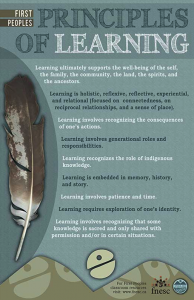Learning ultimately supports the well-being of the self, the family, the community, the land, the spirits, and the ancestors.
“This learning teaches students to think about how their actions support themselves and those around them.”
Paterson – Dec.3 Formal – Core Competencies
“This learning supports the land, because it encourages a higher level of understanding of the land that the students live, learn, and play upon.”
Paterson Nov.26 Formal – Science:Art
Learning is holistic, reflexive, reflective, experiential, and relational (focused on connectedness, on reciprocal relationships, and a sense of place).
“This learning allows students to be reflexive and reflective in the way that they interact with each other and in their actions and behaviours. Self-reflection is important in students learning and allows them to modify how they behave.”
Paterson – Dec.3 Formal – Core Competencies
“Students will learn through experimenting with math. Students will experiment with animal toys and other objects in the classroom. Students will use their findings in the classroom to communicate math ideas.”
“Learning is focused on a sense of place, as students can recognize the seasonal changes that are occurring in their place – at home, at school, or in the community.”
Paterson Nov.26 Formal – Science:Art
“Students will learn through experimenting with math counters. Students will work with peers to create stories about their math.”
Learning involves recognizing the consequences of one’s actions.
Learning involves generational roles and responsibilities.
Learning recognizes the role of Indigenous knowledge.
“Students are using the bear of the seven sacred teachings to do their self-assessments. This shows recognition of Indigenous ways of being and knowing.”
Paterson – Dec.3 Formal – Core Competencies
Learning is embedded in memory, history, and story.
“Each week, students use stories, songs, puppets, and images to learn about each letter of the alphabet. Students are asked each week to use memory in recalling their past letters through their letter songs, stories, actions, and sounds.”
“Students will listen to a story by the teacher to introduce the lessons. Students will create their own stories about their boards.”
Learning involves patience and time.
“Students must be patient with themselves if their self-assessment determines that they have room to improve. Students can take time to reach their goals for themselves.”
Paterson – Dec.3 Formal – Core Competencies
“Students must be patient and not get discouraged when they are having trouble connecting images to sounds. This learning is learning that they have undertaken over the course of the year thus far. Students can recognize this accomplishment.”
“Students will be patient with themselves as they learn this new math. Students will practice their new math language through the week.”
Learning requires exploration of one’s identity.
“Students will explore their own identities through their self-assessments.”
Paterson – Dec.3 Formal – Core Competencies
Learning involves recognizing that some knowledge is sacred and only shared with permission and/or in certain situations.
Resources:
First Peoples Principles of Learning – Poster – from FNESC
http://www.fnesc.ca/wp/wp-content/uploads/2015/09/PUB-LFP-POSTER-Principles-of-Learning-First-Peoples-poster-11×17.pdf
First Peoples Principles of Learning – Blog – by Jo Chrona from FNESC
https://firstpeoplesprinciplesoflearning.wordpress.com/
Learning First Peoples Classroom Resources – from FNESC
http://www.fnesc.ca/learningfirstpeoples/
